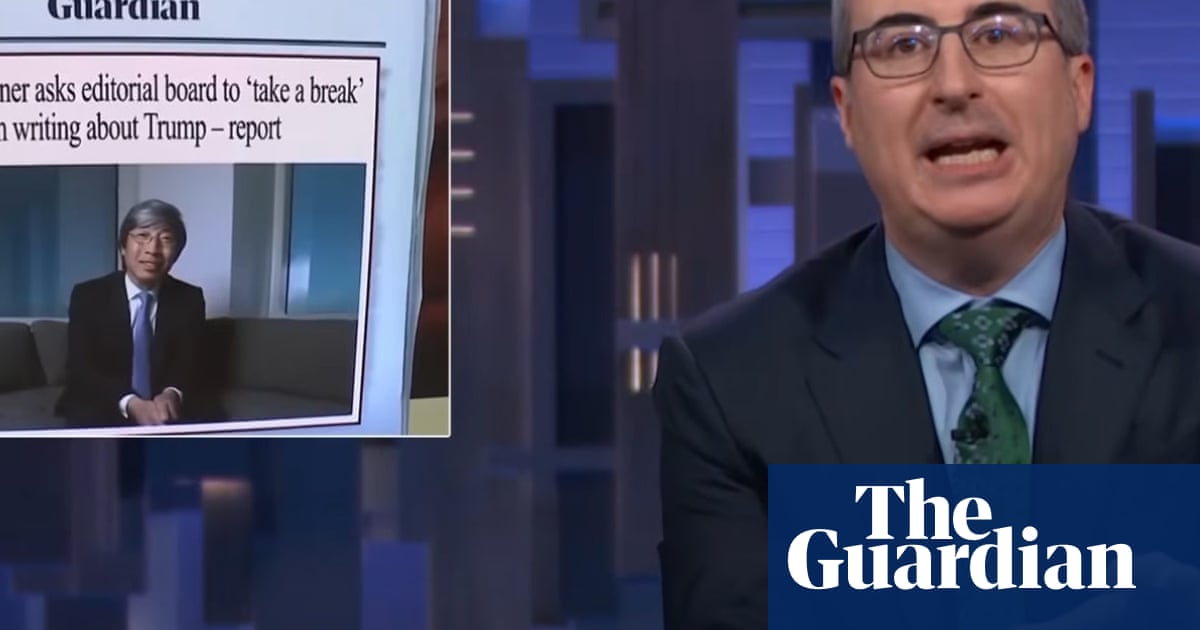John Oliver made a plea for a free press to continue in the US in Sunday’s episode of his weekly HBO show.
On Last Week Tonight, the host talked about howDonald Trumphas “always been antagonistic” with the press. “The problem is Trump clearly only likes when people are nice to him,” he said.
Since taking office for the second time, he has “escalated attacks” on the press, referring to networks such as CNN as “corrupt and illegal” which has made some of them be “more submissive” rather than being the “fierce watchdogs of truth” they should be.
He said that there had been a “noticeably gentler” response to him this time with people such as Jeff Bezos, who owns the Washington Post going “out of his way to cosy up to Trump” including appearing close to him at his inauguration.
Oliver joked that this wasn’t bending the knee but “bending both knees, arching your back and relaxing your holes”.
At the same time, the editorial board at the LA Times were told to take a break from writing about Trump and focus on other subjects. “Even as threats to the free press seem to be on the rise, resistance to them seems to be waning,” he said.
He spoke of the White House press corps and how AP was banned for the “dumbest imaginable reason” after journalists refused to call the Gulf of Mexico the Gulf of America.
A legal battle allowed them back in but questions and time are now being dominated by loyalists and Trump is “managing to get the sycophantic questions he prefers” from far-right news outlets and influencers.
The FCC, which is supposed to be an independent commission, is now headed by the Trump appointee Brendan Carr who immediately spoke on Fox News about how he would be helping to enact the president’s agenda. Oliver said this is “not what your job is supposed to be” calling Carr “obsequious”.
“You don’t wanna see an NBA ref wearing one of the team’s uniforms,” he said, adding that Carr and the FCC were now “deep in the tank for the president”.
Carr “wasted no time pursuing Trump’s agenda” with investigations now aimed at all major broadcasting outlets except for Fox.
Trump has been filing lawsuits as well, demanding money at the same time that the FCC makes noises, hoping that networks settle and “maybe they think twice about their coverage in the future”.
He used the example of CBS and the 60 Minutes furore with Trump claiming that they “misleadingly edited” an interview with Kamala Harris. He sued the network in what experts have called a “frivolous and dangerous” suit.
Oliver conceded that her answer on Netanyahu and Gaza was “shitty” saying she spoke as if she had “a thought in English but with French grammar”.
But it’s a “pretty standard practice” to air “both halves of a single answer” at different times with Oliver showing footage of Fox also massaging a Trump interview.
He sued them for fraud and $20bn in damages and while they “initially fought back” the FCC began investigating it as news distortion at the same time as CBS’s parent company, Paramount, was looking to finalise a huge merger that requires FCC approval. Paramount’s chief, Shari Redstone, “favours settling the case” which ultimately led to the head of 60 Minutes resigning.
He warned that what is happening on the local level wasn’t getting “nearly the same degree of attention” but was “just as worrying”.
Oliver used the example of KCBS radio running a story about Ice activities in San Jose, which led to a “formal investigation” even though it was “literally the whole point of local news radio” to report on such stories.
Even though claims of impropriety were “meritless” the station hadn’t “openly defended their journalists”
Oliver warned that the government was “controlling criticism”, which he added “is to put it bluntly authoritarianism”.
He said “we’ve seen countries backslide and the press tends to be one of the first casualties” using the examples of Hungary and the Philippines.
He finished by saying “fundamental rights and freedoms are worth fighting for” and that the press shouldn’t “comply with Trump’s ridiculous demands prematurely”.
